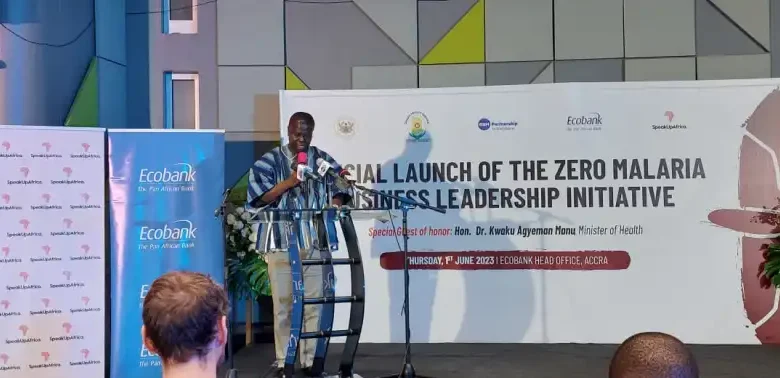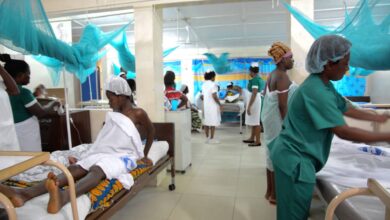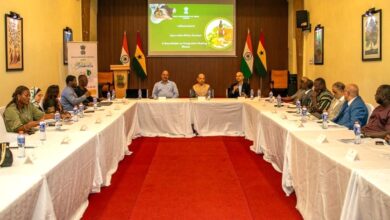Ecobank Ghana , others honoured for Zero Malaria Business Leadership Initiative

AROUND a 100 business leaders and representatives of governments and organizations from Benin, Burkina Faso, Ghana, Senegal and Uganda gathered at an awards ceremony to celebrate the private sector champions and companies that have contributed to the fight against malaria through the “Zero Malaria Business Leadership Initiative”.
Nine companies and three champions, including Aké Natondé from Benin, Kenneth Mugisha, President of Malaria Free Uganda, and Samuel Asiedu Agyei, Director of Anglogold Ashanti Malaria (AGAMAL) in Ghana, were recognized for their significant contributions to the fight against malaria between 2021 and 2024, to the tune of $6 million in in-kind and financial contributions.
According to the World Health Organisation (WHO), despite sustained global efforts to reduce malaria cases, 249 million cases were recorded in 2022, 94% of them in sub-Saharan Africa.
This preventable and treatable disease caused 608,000 deaths worldwide. In some African countries, malaria can impact GDP growth by up to 1.3%, placing a significant burden on businesses. The involvement of the private sector is essential to boost national objectives and mobilize more partners and resources.
It is against this backdrop that in 2020, the Ecobank Group, in collaboration with the RBM Partnership to End Malaria and Speak Up Africa, launched the “Zero Malaria Business Leadership Initiative” to mobilize the private sector for malaria control efforts. Since its launch, the initiative, implemented in Benin, Burkina Faso, Ghana, Senegal and Uganda, has raised $6 million in financial and in-kind contributions.
To date, some 60 companies from the African private sector have contributed, and many business leaders considered champions in this fight have lent their voice and expertise to strengthen the prioritization of malaria by bringing together decision-makers.
At the gala dinner, Yves Mayilamene, Group Executive, Human Resources, Ecobank, declared: “As the leading pan-African banking Group, we could not remain insensitive to the damage caused by this disease within our communities. We are an African bank, and our purpose is Africa. We are also firmly committed to going beyond in meeting our corporate and social responsibility. This is exemplified by our Ecobank Foundation through which Ecobank shows its actions as a good corporate citizen. Therefore, launching the Zero Malaria Business Leadership Initiative in 2020 was no surprise. Together, we recognised that the private sector must play a major role in helping to end malaria by providing essential funding, broader awareness and political advocacy – and acting as champions. Doing so, they help strengthen the partnership around national malaria control programmes.”
RBM representative Philippe Batienon in turn offered words of encouragement to the finalists from the CEO: “I am delighted that the Zero Malaria Business Leadership Initiative has been able to come together in one place to honor the work which is being done as part of this programme and congratulate the partners for their great success. The RBM Partnership is just that – a Partnership. The ability to convene with one mission, in a multisectoral approach, to collaborate and work together to end malaria, gives me great hope that we will be able to defeat this disease. I congratulate the Awards winners which have dedicated time and resources to this cause, as well as thanks to the Togolese Government, Ecobank Foundation and Speak Up Africa for their continued determination to support this fight. I urge business leaders inspired by this moment to come together and join us. Cross-sectorally, we can achieve our goals,” – Dr Michael Adekunle Charles, CEO RBM Partnership to End Malaria.
Yacine Djibo, founder and executive director of Speak Up Africa, said: “Health and the economy are closely linked. At a time when the cost of treating malaria and its impact on our African economies is well known, we need more than ever to rethink the fight against this old, preventable and treatable disease. It is vital that we work together to strengthen political commitment, coordinate the actions of all stakeholders and guarantee sustainable domestic funding in each of our states. At Speak Up Africa, we are convinced that Africa’s private sector has enormous potential to catalyze positive change, and we recognize the power of partnerships to solve African problems including malaria.”
The ceremony marks the close of the initiative’s successful pilot phase. The lessons learned will help document the social impact that private sector involvement can play.




